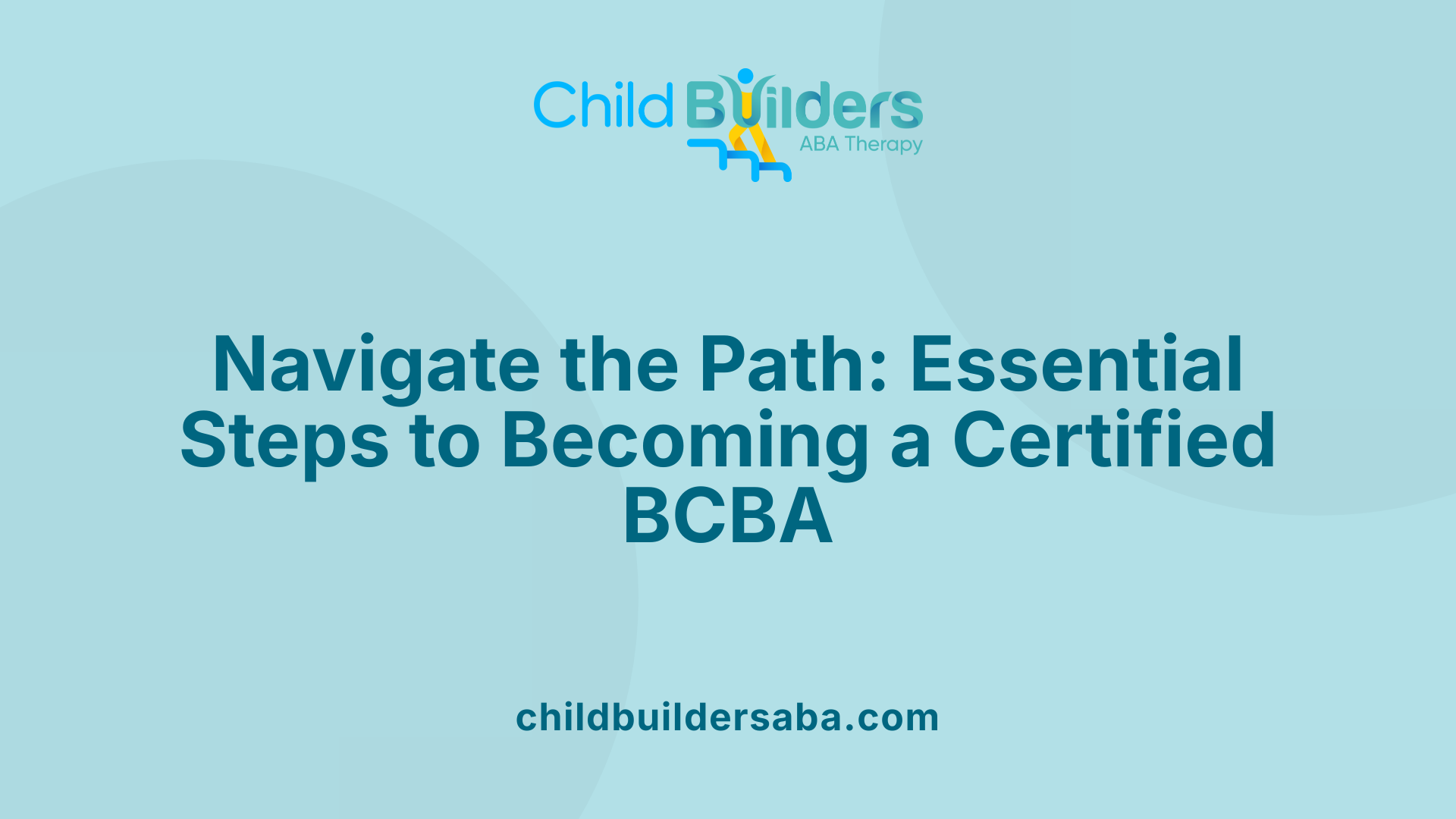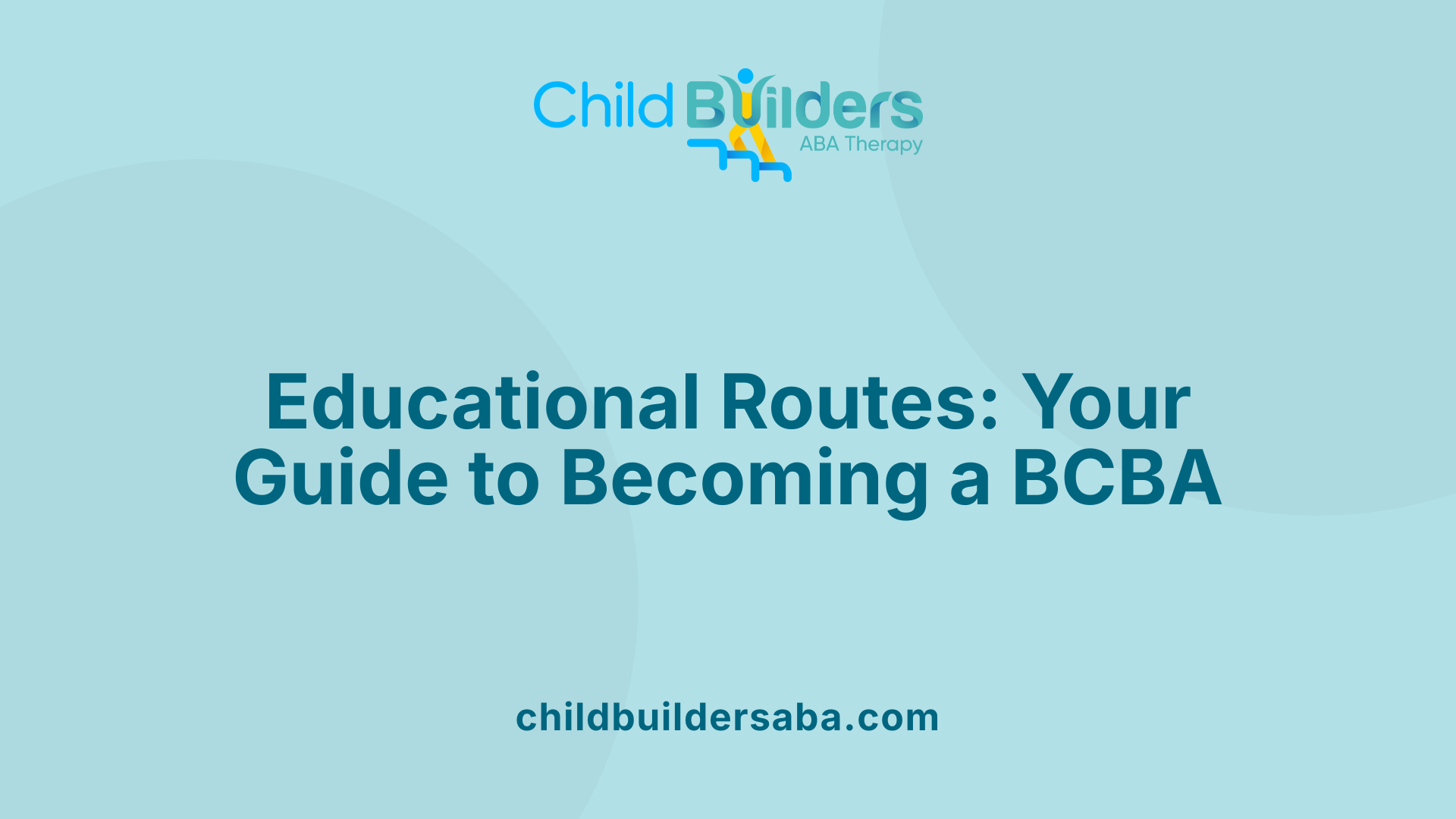BCBA Career Path To Take

Understanding the BCBA Career Path: A Comprehensive Guide
The field of Applied Behavior Analysis (ABA) offers a rewarding career for those passionate about making a difference in individuals' lives, especially in supporting developmental disabilities and behavioral challenges. This article explores the detailed pathway to becoming a Board Certified Behavior Analyst (BCBA), outlining educational requirements, certification steps, career prospects, earning potential, and advanced opportunities for growth.
Foundations of the BCBA Credential: Requirements and Certification Process

What are the requirements and steps involved in becoming a Board Certified Behavior Analyst (BCBA)?
Becoming a BCBA involves a series of educational, experiential, and examination steps. First, aspiring BCBAs must earn a master's degree in fields like psychology, education, or applied behavior analysis from an accredited institution. These programs often require coursework in behavior analysis, which can be verified through organizations such as the Association for Behavior Analysis International (ABAI).
Next, candidates must complete supervised fieldwork hours. Depending on the pathway, they need either 1,500 hours of concentrated supervised experience or up to 2,000 hours. During this time, they practice behavioral procedures under the supervision of a qualified BCBA, gaining practical, hands-on experience.
Once educational and fieldwork requirements are fulfilled, the next step is to apply to the Behavior Analyst Certification Board (BACB) and register for the certification exam. The BCBA exam includes approximately 160 to 185 multiple-choice questions, covering topics such as behavioral principles, measurement, assessment, and intervention. Candidates must pass this exam to earn certification.
After successful certification, BCBAs are required to recertify every two years. This process involves completing continuing education units (CEUs), paying recertification fees, and following the BACB’s ethics standards. Additionally, independent practitioners may need to meet state-specific licensing requirements to practice legally.
Starting from high school or college, the typical timeline to become a BCBA spans around 6 to 7 years—covering bachelor's education (4 years) and master's studies (2 to 3 years). This comprehensive pathway ensures professionals are well-equipped with foundational knowledge and practical skills.
In summary, the process to become a BCBA includes earning a relevant master's degree, completing supervised fieldwork, passing the BACB exam, and committing to ongoing professional development through recertification practices.
Educational Pathways to BCBA Certification

What educational pathways and qualifications are needed to become a BCBA?
Becoming a Board Certified Behavior Analyst (BCBA) requires a structured educational pathway that balances academic learning and practical experience. The foundational requirement is earning a master's degree in applied behavior analysis (ABA), psychology, education, or a related field from an ABAI-recognized or accredited program.
Most aspiring BCBAs must complete a total of 315 hours of graduate-level coursework. These courses encompass essential topics such as ethics, behavioral assessment, intervention strategies, and behavior change procedures. This coursework ensures candidates develop a comprehensive understanding of behavior analysis principles.
In addition to academic coursework, candidates are required to gain hands-on experience. This involves completing between 1,500 and 2,000 hours of supervised practical fieldwork. During this time, they engage in applying behavioral procedures under supervision, which solidifies their skills in real-world settings.
Candidates need to document their coursework and supervised hours thoroughly. Once these requirements are fulfilled, they can apply to sit for the BACB certification exam.
The certification exam includes multiple-choice questions designed around the BACB Task List, assessing knowledge and application of behavior analysis principles. Passing this exam is essential to become a recognized BCBA.
Maintaining the credential involves ongoing professional development. Certified BCBAs must complete continuing education units (CEUs), adhere to ethics standards, and recertify every two years to keep their certification active.
In summary, the streamlined pathway to becoming a BCBA combines academic achievement with practical experience, culminating in a rigorous exam and ongoing professional requirements to ensure high standards in the field of behavioral analysis.
The Step-by-Step Career Roadmap to Becoming a BCBA

What are the typical career steps to pursue a BCBA career?
Starting a journey toward becoming a Board Certified Behavior Analyst (BCBA) involves several important educational and professional milestones. The first step is earning a bachelor’s degree in relevant fields such as education, psychology, or behavioral sciences.
After completing an undergraduate program, candidates must pursue a graduate degree—most commonly a master’s in Applied Behavior Analysis (ABA)—from an accredited university. This graduate program must include coursework verified by the Behavior Analysis Certification Board (BACB) to ensure comprehensive training in behavioral principles, assessment, and intervention.
Following education, aspiring BCBAs need to complete supervised fieldwork hours. These can range from 1,500 to 2,000 hours, during which they gain practical experience applying behavioral procedures under the supervision of a qualified professional. The supervised experience helps develop skills essential for effective client intervention and professional growth.
Once the required hours are completed, candidates are eligible to sit for the BACB certification exam. The exam contains 185 questions covering foundational principles, assessment techniques, intervention strategies, and professional standards. Successful passage of this exam certifies individuals as BCBAs.
In addition to gaining certification, state licensure is often a requirement to practice legally in various regions. The licensure process involves applying through the relevant licensing authority, meeting additional state-specific criteria, and adhering to ethical standards.
Upon obtaining certification and licensure, BCBAs can seek employment across multiple settings, including schools, clinics, residential facilities, and research institutions. Maintaining their credential involves ongoing continuing education and periodic renewal, ensuring that they stay current with advances in behavior analysis.
This structured pathway ensures that BCBAs are well-prepared to deliver high-quality behavioral services, helping diverse populations improve their outcomes and quality of life.
Diverse Career Opportunities and Roles for BCBAs

What are the career prospects and job options for BCBAs?
Board Certified Behavior Analysts (BCBAs) enjoy a wide range of employment options across different settings and populations. They can work in clinics, schools, hospitals, private practices, or directly in clients’ homes.
Many BCBAs focus on supporting individuals with autism spectrum disorders and other developmental disabilities. They develop behavioral interventions, conduct assessments, and train families and staff to implement effective strategies.
Beyond direct client work, BCBAs have opportunities in research, policy development, education, and health services. They may work in criminal justice systems to modify offender behavior or collaborate with animal trainers using behavior analysis principles.
Some prominent organizations employing BCBAs include Autism Learning Partners, BlueSprig, and Morpho Behavioral Services. Roles vary from behavior analyst to supervisor, program manager, or clinical director.
Salaries generally range from around $52 per hour to over $87,000 annually, often with benefits such as signing bonuses, flexible schedules, and options for telehealth sessions.
Expanding their qualifications, some BCBAs pursue additional certifications like BCaBA or CAS. They also engage in supervisory, training, and consulting roles, which can lead to leadership positions or niche specialties.
Overall, the career outlook is positive, with many opportunities for growth and specialization, reflecting the increasing demand for behavior analysis across multiple sectors.
Salary Expectations and Job Market Outlook for BCBAs
What is the typical salary and job market outlook for BCBAs?
The earning potential for Board Certified Behavior Analysts (BCBAs) is quite strong and varies depending on experience, location, and work setting. On average, BCBAs in the United States earn approximately $75,910 annually as of 2025. Entry-level positions often start around $50,000 to $60,000, while those with more experience or in leadership roles can make over $100,000 per year.
High-demand regions significantly influence salaries. States like California, Massachusetts, Texas, New Jersey, and Florida tend to offer higher compensation due to larger demand and cost of living adjustments. For instance, a BCBA working in California may earn well above the national average, especially in urban centers.
The job outlook for BCBAs is very promising. Employment growth is projected at around 20-23% over the next decade, much faster than average for other professions. This increase is driven by the rising need for ABA services in healthcare, education, and community programs.
The expanding scope of practice, coupled with the rise in autism diagnoses and mental health awareness, contributes to the high demand for qualified BCBAs. As more organizations recognize the value of behavior analysis, opportunities for career advancement and specialization continue to grow, making the field attractive for new graduates and seasoned professionals alike.
| Salary Range | Average Salary | Influencing Factors |
|---|---|---|
| $50,000 - $60,000 | Starting salary | Location, experience |
| $75,000 - $90,000 | Typical median | Work setting, specialization |
| $100,000+ | Leadership roles, high-demand areas | Education level, seniority |
Overall, BCBAs benefit from a healthy job market with competitive pay, strong growth prospects, and diverse career paths across various sectors.
Expanding Horizons: Certifications, Specializations, and Advanced Education
Are there online options for obtaining BCBA certification or coursework?
Yes, aspiring BCBAs can pursue online pathways to meet certification requirements. Several accredited programs, including offerings from institutions like Arizona State University, deliver 100% online graduate certificates in applied behavior analysis. These programs cover essential areas such as assessment, ethics, behavioral principles, and intervention strategies, preparing students for the BCBA exam.
While the coursework can be completed asynchronously and flexibly online, practical supervised experience still requires in-person hours to qualify for certification. This blended approach allows students to study at their own pace while fulfilling the necessary fieldwork commitments.
Overall, online programs provide accessible options for students seeking BCBA certification, making the process more flexible, though hands-on supervision remains a vital component of the pathway.
What certifications or further education are relevant for advancing a BCBA career?
For those looking to advance their careers, additional certifications and higher education options are available. One prominent option is the BCBA-D, which is not a separate certification but a designation indicating doctoral-level training in behavior analysis. Achieving this involves demonstrating extensive research, advanced coursework, and professional experience.
Further specialization can be pursued through certifications in areas like organizational behavior management or autism spectrum disorder treatment. Completing a doctoral degree in behavior analysis or related fields opens opportunities in academia, research, and leadership roles.
Continuing education through workshops, seminars, and staying updated with BACB standards enhances professional development. Pursuing these advanced certifications and degrees allows BCBAs to broaden their expertise and explore diverse career paths in research, clinical practice, or organizational consulting.
Additional Insights: The Growing Demand and Future of the BCBA Profession
Market trends and job growth
The demand for Board Certified Behavior Analysts (BCBAs) has surged in recent years. From 2023 to 2024, employment within the field increased by an impressive 58%, reflecting a rising recognition of behavioral interventions and support. Major states such as California, Massachusetts, Texas, New Jersey, and Florida are experiencing the highest demand for these professionals.
This growth is driven by an increased awareness of autism spectrum disorder and other behavioral challenges, coupled with expanding public and private funding for behavioral health services. As awareness spreads, more institutions, clinics, schools, and organizations seek qualified BCBAs to develop and implement effective interventions.
The importance of continuous education
Given the evolving nature of behavioral science and the BCBA certification requirements, ongoing education is crucial. Every two years, BCBAs must recertify by earning Continuing Education Units (CEUs), paying fees, and maintaining ethical standards. This ongoing professional development ensures practitioners stay updated on the latest research, methodologies, and ethical guidelines.
Additionally, many BCBAs further specialize in areas such as social skills development, sexual behavior, or technological innovations like app development and virtual reality therapies. Continuous learning not only enhances skill sets but also unlocks new career opportunities.
Specialization and leadership opportunities
As the field matures, many BCBAs explore specialties beyond general intervention. Opportunities abound in areas like organizational behavior management (OBM), early childhood education, adult mental health, and research. Gaining expertise can lead to leadership roles such as clinical supervisors, program directors, or university faculty.
Some BCBAs also venture into entrepreneurial pathways, creating private practices, consulting firms, or developing innovative ABA-based technology products. Leadership roles often involve overseeing complex caseloads, training new professionals, influencing policy, and advocating for individuals with behavioral needs.
Future career prospects
With continued industry growth, BCBAs will find increasing opportunities across diverse settings—from schools and clinics to corporate environments and aging populations. The profession is expected to expand further as awareness and necessity for behavioral supports grow worldwide.
| Aspect | Opportunities | Additional Notes |
|---|---|---|
| Job Growth | 58% increase (2023-2024) | Driven by autism awareness and behavioral support needs |
| Education | CEUs, specialization | Ongoing learning required to stay certified |
| Career Pathways | Leadership, consulting, entrepreneurship | Multiple tracks for growth and impact |
| Sectors | Education, health, corporate, research | Broadening application areas |
The future of BCBA careers is promising, with increasing demand and expanding roles for trained professionals willing to adapt and grow within the evolving industry.
Embarking on a Rewarding ABA Career
Becoming a BCBA involves a rigorous educational and practical process, but it opens doors to meaningful and diverse career paths that can significantly impact individuals and communities. With increasing demand, competitive salaries, and numerous specializations and advancement opportunities, a career in ABA offers both personal fulfillment and professional growth. Aspiring behavior analysts should stay informed about evolving certification requirements and industry trends to maximize their career potential in this dynamic field.
References
- How to Become a Board-Certified Behavior Analyst (BCBA)
- Board Certified Behavioral Analyst Career Overview - Psychology.org
- 6 ABA career paths with M.S. Applied Behavior Analysis
- BCBA Career Paths: Exploring Diverse Career Options for BCBAs
- How to Become a Board-Certified Behavior Analyst (BCBA)
- Board Certified Behavioral Analyst Career Overview - Psychology.org
- How to become a BCBA? | CareerVillage
- [PDF] BCBA Handbook - BACB
- How to Become a Board Certified Behavior Analyst (BCBA): Five Steps
























.jpg)












































































